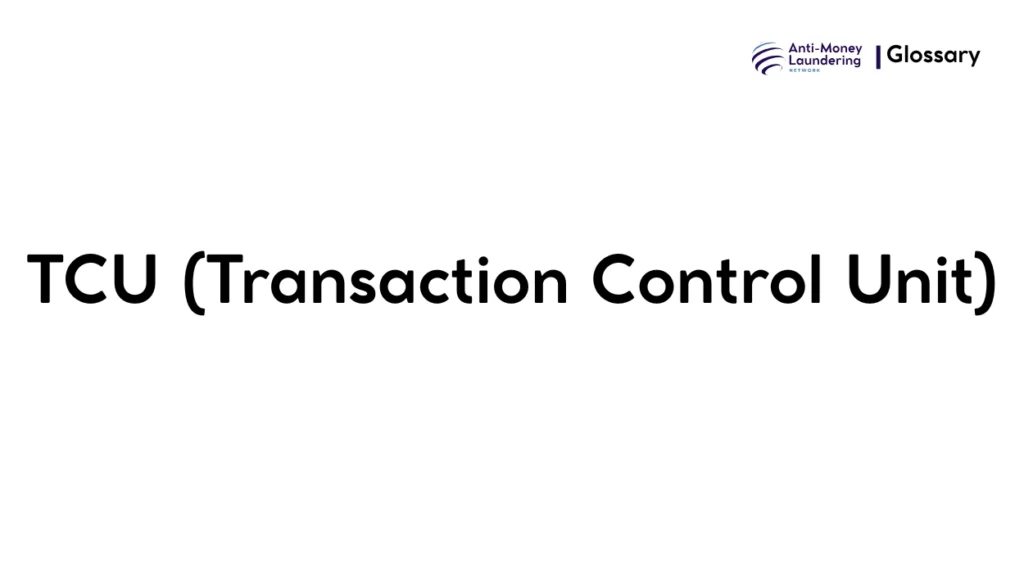Definition
A Transaction Control Unit (TCU) in Anti-Money Laundering (AML) is a specialized operational component within a financial institution or regulatory body responsible for monitoring, analyzing, and controlling financial transactions to detect and prevent money laundering, terrorist financing, and other illicit financial activities. It acts as a centralized hub for the systematic review of transaction data against established AML rules, risk profiles, and regulatory requirements.
Purpose and Regulatory Basis
The primary purpose of a TCU is to implement effective transaction controls that align with AML regulations and standards to mitigate risks associated with financial crimes. By scrutinizing transactions in real-time or retrospectively, the TCU helps ensure compliance with global AML frameworks such as:
- The Financial Action Task Force (FATF) Recommendations, which emphasize transaction monitoring as a core AML function.
- The USA PATRIOT Act, mandating rigorous transaction oversight to counteract money laundering and terrorist finance.
- The European Union’s Anti-Money Laundering Directives (AMLD), requiring financial institutions to maintain robust transaction monitoring and reporting systems.
The regulatory focus on TCUs stems from the need to maintain the integrity of financial systems and to provide timely reporting of suspicious activity to authorities.
When and How it Applies
TCUs operate continuously to assess a wide range of transactions such as deposits, withdrawals, wire transfers, and currency exchanges. They apply when:
- Transactions exceed defined thresholds or involve high-risk jurisdictions or customers.
- Patterns indicative of layering, structuring, or other laundering typologies emerge.
- Alerts are generated by automated transaction monitoring systems requiring review.
For example, a TCU would intervene if a customer initiates multiple transfers just below regulatory reporting thresholds or transfers funds to a sanctioned country.
Types or Variants of TCU
While the term “TCU” may vary across institutions, its functional variants can include:
- Centralized TCUs: Dedicated units serving entire institutions with centralized transaction monitoring expertise and resources.
- Decentralized TCUs: Embedded within business units where transaction controls are managed locally but coordinated by a central AML compliance function.
- Regulatory TCUs: Units within Financial Intelligence Units (FIUs) or supervisory authorities that analyze transaction reports submitted by financial institutions.
Procedures and Implementation
Implementing a TCU involves several key steps:
- System Integration: Deploying advanced transaction monitoring software capable of ingesting and analyzing transaction data.
- Rule Setting and Risk Profiling: Establishing transaction control parameters based on risk assessments, regulatory guidelines, and typology trends.
- Alert Generation and Triage: Automated systems flag transactions that breach control limits or match suspicious patterns.
- Investigation and Analysis: TCU analysts investigate flagged transactions to determine if they constitute suspicious activity.
- Reporting: Confirmed suspicious activities are reported to regulatory authorities through Suspicious Activity Reports (SARs) or Suspicious Transaction Reports (STRs).
- Recordkeeping and Audit Trails: Comprehensive documentation of transaction reviews, investigations, and reports to demonstrate compliance.
Impact on Customers/Clients
From the customer’s perspective, TCU processes may result in:
- Enhanced scrutiny of transactions, potentially leading to delays in processing.
- Occasional transaction holds while investigations occur.
- Requests for additional information to verify transaction legitimacy.
Customers have rights under applicable privacy and financial service regulations but must comply with institutions’ AML controls for lawful financial activity.
Duration, Review, and Resolution
Transaction controls managed by TCUs are ongoing. Alerts are reviewed promptly, with investigations typically concluded within regulatory timeframes (e.g., days to weeks). Cases may be escalated for regulatory reporting or closed with no further action if cleared.
Institutions regularly review TCU rules and systems to adapt to emerging risks and regulatory changes, ensuring continuous effectiveness.
Reporting and Compliance Duties
Financial institutions must ensure:
- Compliance with AML reporting obligations through timely submission of SARs/STRs.
- Maintenance of detailed records of transaction monitoring and investigations.
- Regular training of TCU personnel.
- Independent audits of transaction control effectiveness.
Failure to comply with reporting duties can result in regulatory sanctions, financial penalties, and reputational damage.
Related AML Terms
TCUs are closely linked to concepts such as:
- Transaction Monitoring Systems: Software tools facilitating transaction analysis.
- Suspicious Activity Reports (SAR/STR): Reports of suspected money laundering.
- Know Your Customer (KYC): Customer identification underpinning transaction risk profiles.
- Financial Intelligence Unit (FIU): Government agency receiving and analyzing SARs.
- Customer Due Diligence (CDD): Processes to understand customer risk factors.
Challenges and Best Practices
Common challenges include:
- Managing high volumes of false positives from automated systems.
- Keeping pace with evolving money laundering methods and regulatory changes.
- Balancing customer experience with rigorous controls.
Best practices involve:
- Using advanced analytics and AI to enhance detection accuracy.
- Improving staff expertise through continual training.
- Implementing a risk-based approach customizing controls by customer and transaction risk.
Recent Developments
TCUs increasingly leverage technologies such as artificial intelligence, machine learning, and big data analytics to improve the detection of sophisticated laundering schemes. Regulatory updates continue to push for enhanced transparency and collaboration between institutions and law enforcement bodies.
A Transaction Control Unit (TCU) is a vital element of a financial institution’s AML framework, serving as a dedicated operational hub for monitoring, analyzing, and controlling financial transactions to detect and prevent money laundering and related financial crimes. Aligned with global AML regulations, TCUs implement systematic transaction controls, investigative procedures, and reporting obligations, playing a critical role in safeguarding financial integrity and regulatory compliance.

